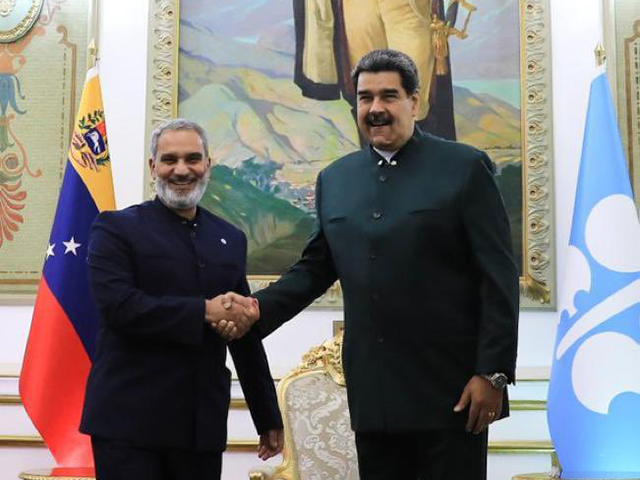The Secretary General of the Organization of Petroleum Exporting Countries (OPEC), Haitham Al Ghais, traveled to Venezuela on Tuesday to meet with socialist dictator Nicolás Maduro, touting the “key role” of Venezuelan oil in the international market.
During an official event on Wednesday, Al Ghais, who recently assumed OPEC’s head office in August, praised the socialist dictator and his “inspiring leadership” and applauded the Maduro regime for allegedly overcoming U.S. sanctions imposed on Venezuela’s oil industry by the Trump administration in 2019 due to widespread human rights abuses and drug trafficking. Al Ghais also claimed that Maduro had surpassed obstacles created by the Chinese Coronavirus pandemic.
Al Ghais stated that Venezuela’s sanctioned oil will play a key role in meeting global energy demand — which, he predicted, will increase considerably in the next two decades.
“Venezuela plays an essential role in supplying the world with the oil it needs. I say this because this country is blessed by God as it has the largest reserves on the planet,” Al Ghais asserted.
Despite the fact that Venezuela’s oil industry infrastructure has severely deteriorated under the nation’s socialist system and its production has dropped to a point where Venezuela cannot fulfill its own internal oil demand and is now importing, Maduro claimed that his regime is ready to respond to global oil demand.
“Venezuela is ready and willing to fulfill its role and supply, in a stable and safe way, the oil and gas market that the world economy needs,” Maduro said during his encounter with the OPEC head.
Maduro also claimed to be an advocate of keeping oil prices at a “stable” rate of $100 per barrel.
“We from OPEC could send a powerful message of stability and balance. Move all the corresponding plays and actions so that the price of oil is maintained in a fair and balanced way around 100 dollars per barrel,” Maduro said.
Maduro used the meeting with OPEC’s secretary general to blame the near destruction of Venezuela’s oil industry — which is controlled in its entirety by the socialist regime he presides over — on the “corruption of a mafia” that, according to him, “destroyed its fundamental structure of morality and functioning.”
Venezuela’s oil refineries and infrastructure, which the Maduro regime ran to the ground over the past decade, have been undergoing repairs with the help of Iran — yet, their operations are constantly interrupted by the precarious state of Venezuela’s power grid and the regular blackouts that often occur outside the nation’s capital district. Maduro has also reportedly been evading U.S. sanctions by shipping millions of barrels of oil with the help of one of China’s state-owned defense firms.
The Biden administration, which does not officially recognize Maduro as Venezuela’s legitimate president, has sent official delegations to Venezuela in 2022 to discuss potential oil deals.
Experts have stated that due to a lack of investment capital, lack of maintenance, and operational problems, Venezuela’s oil production has remained stagnant at approximately 700,000 barrels per day during 2022. In contrast, between 2002 and 2012, Venezuela was able to produce up to 3.2 million barrels per day.
Reports indicate that, while Maduro’s efforts to restore the oil industry his socialist regime brought to ruin managed to raise Venezuela’s oil production to approximately 723,000 barrels per day during August, it remains far from the 2 million barrels per oil that Maduro promised to OPEC in March that his regime would produce.
Maduro also asserted that he will give all “legal guarantees” to foreign investors to exploit Venezuelan gas resources.
“Venezuela has over 50 first-rate gas projects, which have seismic studies carried out and all the legal guarantees for international investors from Russia, Iran, China, Kuwait, Colombia, Mexico, and Argentina, wherever they come from, to exploit Venezuela’s natural gas resources,” Maduro said.
Christian K. Caruzo is a Venezuelan writer and documents life under socialism. You can follow him on Twitter here.

COMMENTS
Please let us know if you're having issues with commenting.